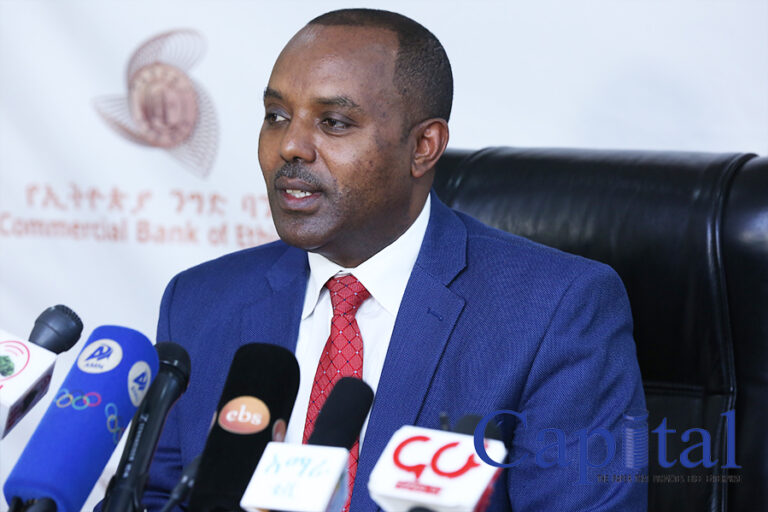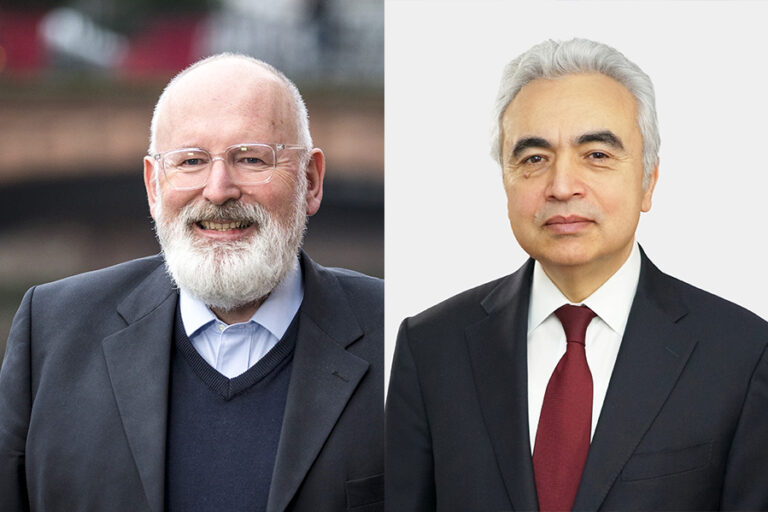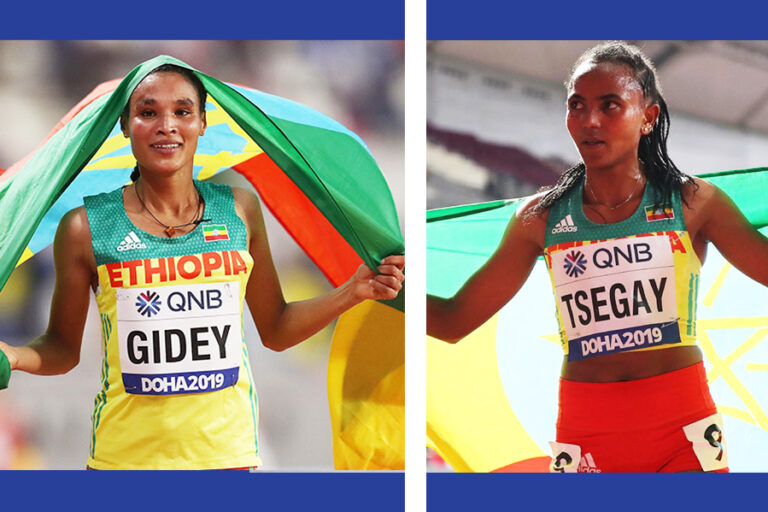Commercial bank of Ethiopia has earned more than 20.3 billion birr in net profit during the just concluded fiscal year of 2020/21, marking new records for the bank’s history. The bank has also collected over 140 billion birr in deposits, bringing the total deposit to 735 billion birr.
In the completed fiscal year, the bank has provided 107 billion birr in loans and bonds to various investment projects and businesses. On similar reporting, 60 billion birr has been recovered from various loans.
The bank has generated more than 2.86 billion dollar from various sources during the budget year in an effort to boost the country’s foreign exchange earnings.
According to Abe Sano, president of the bank, the total assets of commercial bank has reached 20.99 billion birr. He said that the Commercial Bank of Ethiopia (CBE) has performed better in all budgets during the just ended budget year.
“CBE has made great strides in delivering quality and technologically supported services to its customers,” said the president. According to the statement, the number of branches has reached 1700 with 31.4 million customers being severed across the country.
The number of ATM card users has reached more than 6.7 million, and similarly more than 3,091 ATM machines and more than 4,350 post terminals have been set up across the country.
Abe added that efforts to provide customers with banking services without having to go to branches have now become very effective.
The Commercial Bank of Ethiopia (CBE) is contributing to the world’s efforts to modernize the country’s payment system, he said. The Bank’s digital banking growth has grown significantly, with over 529 billion birr being transferred through digital banking during the fiscal year.
Deposit growing significantly, customer account, digital transaction growth, significant strengthened liquidity, review in structure and maintained profitability are listed as successes while loan collection, FCY generation and COVID-19 were listed as challenges that the bank had faced during the fiscal year.
CBE marks historical profit recordings
Food insecurity in Africa aggravates, report argues
By Maya Demissie
The 2020 Africa Regional Overview of Food Security and Nutrition reported increasing levels of food insecurity, in part due to the COVID-19 pandemic.
The report was compiled by the Food and Agriculture Organization of the United Nations, the African Union, and the United Nations Economic Commission for Africa, and argues that food insecurity in the continent is worsening. It outlines a five-step plan towards “rapid and effective transformation of food systems.”
“A common vision, strong political leadership, and effective cross-sectoral collaboration, including the private sector, are essential to agree on trade-offs and identify and implement sustainable solutions to transform food systems for healthy, affordable diets,” according to the report.
In 2019, the number of chronically undernourished people in Africa rose to nearly one-fifth of the population, with numbers continuing to rise today. The number of people affected by severe food insecurity is also increasing, hitting 73 million people in 2019, an increase of 6 million from the year before. 426 million people are moderately food insecure.
Nearly three quarters of Africans cannot afford a healthy diet, 51 percent cannot afford a nutrient-adequate diet, and 11.3 percent cannot afford an energy sufficient diet. An energy sufficient diet would cost about 50 percent of food expenditure budgets for the 430 million Africans living in extreme poverty.
COVID-19 regulations worsened the availability and accessibility of food in Africa. Africa depends on extra-regional food imports of basic products, such as cereals, vegetable oils, sugar, meat and dairy products. This dependence exposed the continent to the economic shocks of COVID-19. Travel bans affected aircrafts and railroads, limiting food movement and decreasing trade. World trade volumes were expected to fall by 13 to 32 percent in 2020.
Economic downturn and the consequential increased poverty rates in Africa account for a portion of the increased food insecurity this past year, the report argues. Real GDP in the continent fell by 2.1 percent in 2020. Tourism-dependent countries were hit harder, with an average GDP decrease of 11.5 percent.
The economic damage is expected to push 26 to 40 million people into extreme poverty. Additionally, unemployment is on the rise as labor jobs were sent home to quarantine. As more people fall into poverty or lose their jobs, they can no longer pay for sufficient food or a diverse diet, according to the report. In Africa, an additional 25 to 42 million people may be undernourished as a result of the economic shocks from COVID-19 pandemic, according to preliminary estimates.
The five-step plan includes performing comprehensive situation analysis, identifying cost drivers of healthy diets, addressing urgent needs of the most vulnerable, identifying policies and investments to leverage food systems transformation, and implementing policy recommendations and monitoring their impact.
Social protection could mitigate food insecurity, the report argues. While the impact on nutrition is weaker, social programs can help to increase overall food consumption and dietary diversity. According to the report, 26 African countries had introduced a social protection program in some form by mid-2020. Liberia, Nigeria, and Cape Verde, among other countries, have introduced delivery or pick-up school lunch initiatives while students learn from home. Taxes and subsidies can also be utilized to make food accessible to those living in poverty.
The report also emphasizes the threat of of maternal and child under nutrition, the leading factor in nutrition-caused diseases in Africa. In Kenya, a program ensured free maternity services for expecting mothers as part of the National Nutrition Action Plan (NNAP), encouraging mothers to deliver their babies in a health facility. During the program, the number of babies born in a health facility increased from 43 to 61 percent. In Ghana, the Baby-Friendly Hospital Initiative helped focus on care and counseling for pregnant mothers and feeding and care practices for infants and young children.
Focus on nutritional education is also suggested within the report. It is recommended that education includes both information on the importance of dietary diversity and specific ways to maintain a healthy diet with a tight budget.
Time to make energy poverty history: Cheap renewables offer the key to universal electricity access in Africa.
By Frans Timmermans and Fatih Birol
Across the globe, nearly 800 million people live without any access to electricity – about 600 million of them in Sub-Saharan Africa. In a world of deepening inequalities between the haves and have-nots, this is a glaring injustice. With cheap renewables and green investments following the pandemic, we can make energy poverty history within the next decade. Universal energy access by 2030 is possible, but we need to start making great strides, and soon. The International Energy Agency and the European Commission therefore invite other partners to join us in putting energy access at the centre of cooperation with Africa.
Lack of electricity inhibits those aspects of daily life that many of us take for granted. Electricity powers our economies: we need it in schools, offices, and hospitals, where it now refrigerates life-saving vaccines. We need to expand electricity access on an industrial scale to enable families in Sub-Saharan Africa to aspire to the same standard of living as families in other parts of the world.
Technological progress and an unprecedented drop in the cost of renewables can now deliver the cheapest electricity humanity has ever seen. In the past two decades, the massive global expansion of electricity access was mainly driven by coal plants. But it no longer makes sense to invest in coal. Africa is the world’s premium location to harness solar energy and is already demonstrating that a cleaner path is possible. Between 2014 and 2019, 20 million people a year in Africa got access to electricity for the first time, with much of the growing demand met by increasingly competitive solar and hydropower installations. Harnessing these abundant energy sources on the African continent can help develop local jobs and avoid expensive import bills.
Unfortunately, despite technological progress, the world is not on track to deliver on our global commitment to universal energy access by 2030. The Covid-19 crisis has caused significant setbacks. Without action, this can develop into a lasting negative trend. Last year, the number of people in sub-Saharan Africa without access to electricity grew – for the first time in eight years. Restrictions due to the pandemic have held back work to connect homes, businesses, schools and hospitals, and the global economic downturn has imposed severe constraints on African countries’ budgets. This has significantly limited the scope for African governments to fund clean energy investments and resulted in millions of people being pushed back into extreme poverty, where they can no longer afford basic electricity services.
Barriers to deploying solar and other renewable technologies in Africa include the initial costs of installing them. Solar and wind power plants have the advantage of free energy supplies – the sun and wind – once they’re up and running. But in developing economies, the upfront costs of setting up mini-grids or standalone home solar systems, especially in rural communities, are enormous given the financial resources of those communities.
In addition, companies trying to set up new renewable projects are not always able to guarantee stable revenues from the get-go and face difficulties attracting investors. In general, businesses across developing economies are plagued by far higher borrowing costs than their counterparts in advanced economies, adding an extra hurdle to any renewable project. These difficulties are now exacerbated by the economic damage from the Covid-19 pandemic, which is lasting much longer in many developing economies in Africa and beyond.
The good news is that there are solutions available to address these challenges. They include innovative pay-as-you-go business models to spread out the upfront costs, improved policy and regulatory frameworks to enable more projects to advance, and greater efforts by international and regional organisations to support the development of the sector and bring down the financing costs of renewables projects.
All governments and relevant international organisations must urgently renew our commitment to end energy poverty by 2030, including at the upcoming UN High Level Dialogue on Energy. And we must back that commitment up with stronger action.
The European Union and the International Energy Agency are partnering to make clean energy access an integral part of international efforts to reach net-zero emissions. This is how we can tackle uneven energy access without locking in any more harmful fossil fuel emissions. The IEA as well as the European Commission, through its Green Energy Initiative, are putting clean energy access at the heart of our collaboration with African governments. We will work to increase the number of people, businesses and industries in Africa who have access to affordable, modern, and sustainable energy services. In 2021, the European Commission’s Green Energy Initiative is entering a new phase. Once in place, grants, technical assistance, and other financial instruments will support investments in renewable energy generation and promote energy efficiency across Africa.
In the next seven years, 30% of the European Union’s budget for international cooperation will go towards tackling climate change. But public funding alone is not enough. Private sector investments will be key and many European companies are ready to step in. But if we are to succeed in making energy poverty history in Africa, we need the whole world to work in concert: a global end to funding overseas coal power, accelerated cooperation on expanding clean electricity in Africa, as well as scaled-up financial support from advanced economies.
Let’s be clear – clean energy access goes beyond climate action. Renewables are good business and an affordable way to produce electricity. Investing in clean energy is a full-fledged strategy for economic development. We therefore count on other leading economies and organisations to take concrete steps with us to make energy poverty history within the next decade.
Ethiopia selects 34 athletes for Tokyo
World record-holders Letesenbet Gidey and Gudaf Tsegay are among the 34 athletes named on Ethiopia’s team for the Tokyo Olympic Games.
Although qualified in more than one event, Gidey and Tsegay – like all other members of the team – will focus on just one event each. Gidey will contest the 10,000m, the event at which she set a world record of 29:01.03 last month, while Tsegay will line up for the 5000m, having clocked a world-leading 14:13.32 in Hengelo on 8 June.
The team also includes world indoor 1500m champion Samuel Tefera and world silver medallists Selemon Barega and Yomif Kejelcha.
Ethiopian team for Tokyo
WOMEN
800m: Habitam Alemu, Workwuha Getachew, Worknesh Mesele
1500m: Freweyni Hailu, Lemlem Hailu, Diribe Welteji
5000m: Ejigayehu Taye, Senbere Teferi, Gudaf Tsegay
10,000m: Tsigie Gebreselama, Tsehay Gemechu, Letesenbet Gidey
Marathon: Roza Dereje, Birhane Dibaba, Tigist Girma
3000m steeplechase: Mekides Abebe, Lomi Muleta, Zerfe Wondimagegn
MEN
800m: Melese Nibret
1500m: Samuel Abate, Tadesse Lemi, Samuel Tefera
5000m: Milkesa Mengesha, Nibret Melak, Getnet Wale
10,000m: Berihu Aregawi, Selemon Barega, Yomif Kejelcha
Marathon: Leslisa Desisa, Shura Kitata, Sisay Lema
3000m steeplechase: Hailemariam Amare, Abrham Sime, Tadesse Takele





